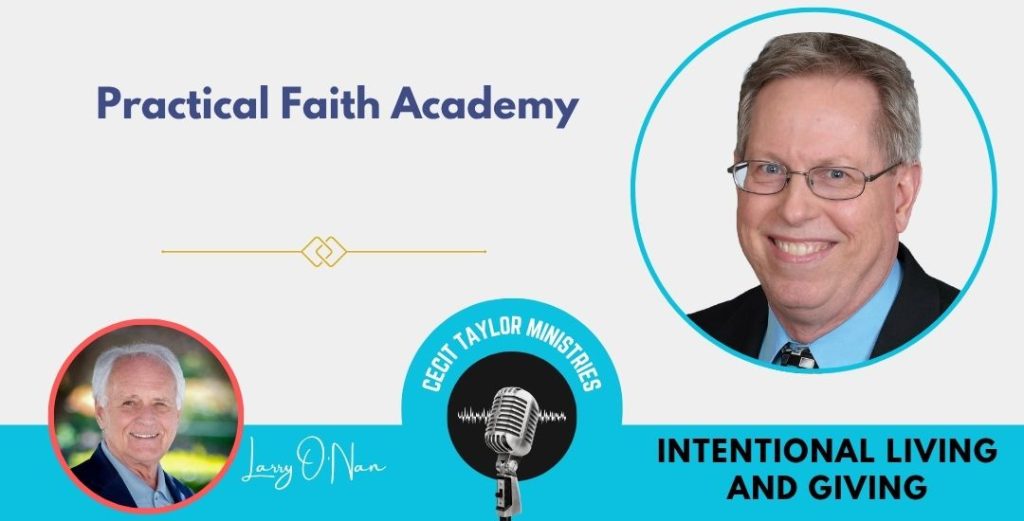There’s a phrase that kept coming to mind as I talked with Cecil Taylor on the Practical Faith Academy podcast:
“I don’t own anything. But I’ve been entrusted with everything.”
That one truth, when embraced, will change your life. It certainly changed mine.
Cecil invited me to join him on his podcast to talk about my book Intentional Living and Giving, but what we ended up having was not just a book discussion. It was a heart-level conversation about what it means to wake up each day with a Kingdom mindset and live with purpose and generosity seven days a week.
Let me take you behind the scenes of that conversation and share some of the key themes that resonated most deeply.
1. We’re Not Owners, We’re Stewards.
The greatest shift in my faith journey happened when I stopped seeing myself as the owner of my time, my resources, my relationships, even my life.
Instead, I began to see myself as a manager of what God owns. That’s what the Bible calls a steward, someone entrusted to care for and distribute someone else’s resources.
In Genesis, we see this clearly: God didn’t create man and say, “Here, this is yours, go do what you want.” No, He said, “Take care of what I’ve made. Name the animals. Tend the garden. Steward My creation.”
That truth hasn’t changed. We’re still stewards of His stuff.

2. Stewardship Isn’t Synonymous with Tithing.
Let’s be honest; when most people hear the word stewardship, their minds jump straight to money. Probably because they’ve only ever heard it mentioned during church giving campaigns.
But biblical stewardship is far broader. As I said in the podcast, money is just one small chapter in the story of stewardship, literally and figuratively. In my book, there’s only one chapter on finances. Why? Because stewardship is about your whole life.
- Your calendar.
- Your gifts.
- Your influence.
- Your relationships.
- Your time.
- Your energy.
Everything.
Stewardship is about how you manage what God has placed in your hands, and how available you are to be used for His purposes.
3. Intentional Living Requires a Mental Shift.
Each day, I wake up with one prayer:
“Lord, what do You have for me today? What have You entrusted to me that You want used for Your glory?”
That mindset keeps me from falling into either of the two ditches we so often see:
- Self-pity: “Woe is me. My car broke down, my shoes are worn, my needs aren’t met…”
- Self-importance: “This is my day, my job, my resources, my life…”
Both miss the mark. Intentional living says, “This day belongs to the King. I’m His steward. I’m on assignment.”
4. You’re Empowered to Obey, Not to Impress
In the conversation with Cecil, we didn’t talk about striving for success in the way the world defines it. We talked about obedience. Simple, daily obedience.
You see, when you understand that God owns it all and you’re simply managing what’s His, the pressure to impress disappears. You’re no longer performing for applause or trying to manufacture results. You’re simply saying, “Yes, Lord,” to the next assignment.
Obedience doesn’t always look spectacular. It’s often quiet. Hidden. Faithful in the small things. But that’s where stewardship begins.
God isn’t calling you to be the most impressive person in the room. He’s calling you to be the most faithful with what you’ve been given.
That’s where the joy is. That’s where the fruit comes. Not from comparison or performance, but from a heart that says, “Whatever You’ve placed in my hands, I’ll use it for You.”
5. God’s Resources Are Limitless.
God is not stingy. He doesn’t run out. And He doesn’t ask us to steward out of scarcity, but out of abundance.
As I’ve said many times, being a good steward doesn’t mean pinching pennies; it means becoming an authorized wealth distributor for the Kingdom.
When you know the One who owns it all, you can give freely.
You can serve boldly.
You can plan generously.
Because the supply isn’t yours to maintain, it’s His to multiply.
6. Stewardship Is Relationship.
At its core, stewardship isn’t a financial concept; it’s a relational one. God didn’t call us to be accountants of His kingdom. He called us to be ambassadors, partners in His mission.
He invites us to come to Him every day and say, “What are we doing today, Lord? Where do You want to move? Who do You want to bless? How can I help?”
That’s stewardship. It’s not a spreadsheet,it’s a relationship. It’s living in communion with the One who has entrusted you with this day, this life, this calling.
Final Thoughts: From Takers to Givers
Cecil asked me toward the end of our conversation, “What’s one baby step someone can take to begin living this way?”
My answer:
Sign it over.
That thing you’ve been holding onto, your calendar, your money, your fears, your plans, hand it over to the true Owner.
Say, “Lord, this is Yours. What do You want to do with it?”
That one shift, from taker to steward, can open up your life in ways you never imagined. It’s not always easy, but it’s always worth it.
Want to take a closer look at these concepts? My book Intentional Living and Giving explores this lifestyle in detail, first the theology, then the practical steps to walk it out.
And if you haven’t already, listen to the full episode of the Practical Faith Academy Podcast. You’ll hear stories, Scripture, and personal moments that shaped my journey, and maybe will shape yours, too.
Click here to listen to the podcast
Let’s live and give with intention, because we are stewards of the King.

